Youth – UCSD Extension – Spring 2012
 For Spring Break Week and Spring Season 2012, we will have more brand new class offerings, more total classes over the course of the season, and some very nice new venues.
For Spring Break Week and Spring Season 2012, we will have more brand new class offerings, more total classes over the course of the season, and some very nice new venues.
Additionally, we are now able to offer accredited K-12 Pre-College programs as well as class accreditation, all available through a unique Fab Lab + UCSD Extension partnership program.
Pre-College Middle and High School courses are presented in partnership with UCSD Extension K-12 College Exploration.
Most are beginner-friendly unless otherwise indicated.
Pre-college/K-12 classes are generally held at UCSD campus or UCSD Extension campus.
Registration is NOW Open, Please save your space by enrolling now on the course of your choice.
We are also offering similar courses for Adults, click here for more information about this program.
Introduction to Creative Computing
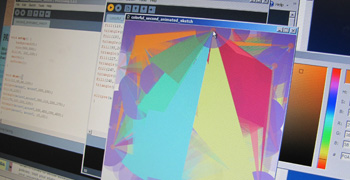 SPRING BREAK: Monday to Friday 04/02/12 – 04/06/12 . 8:30AM – 12:30PM – $200
SPRING BREAK: Monday to Friday 04/02/12 – 04/06/12 . 8:30AM – 12:30PM – $200
Learn about the basics of coding by exploring the Processing Development Environment. This project-based class will focus on the development of fundamental programming skills, creation of applets that feature interactivity, allowing students to create responsive virtual environments. Students will also learn about interface and interactivity through the creation and use of infrared pens and IR-detecting cameras. Additionally, ways in which we commonly interact with the virtual environment will be explored through the dissection of a Wiimote™ and identification of its electronic features. Students will produce at least one final applet that they will be able to manipulate via the infrared controller that they have created. This class is beginner-friendly and hands-on.
Circuit Design
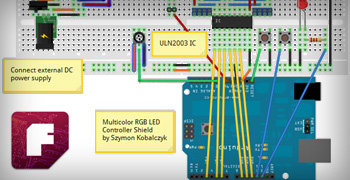 SPRING: Mondays 04/02/12 – 06/04/12 . 3:30PM to 6:00PM – $200
SPRING: Mondays 04/02/12 – 06/04/12 . 3:30PM to 6:00PM – $200
‘Electronic Circuit Design’ is an introductory class to designing and building your own circuit boards. Students will learn basic electronic circuit design principles hands-on. We will use an open-source software program, Fritzing, to create the pcb design in order to connect all the electronic components and will then be milling the pcb boards on FabLab’s very own milling machine, an environmentally-friendly process. Students will start with a simple project: a simple LED (light-emitting diode) blink circuit, that has a switch to turn the LED on and off. This project will use standard through-hole electronic components. The final project will be for a 7-segment display controller, an electronic display device for displaying numbers that is widely used in digital clocks and electronic meters. This last project will use smaller surface-mounted components. Students will learn about basic electronic concepts (voltage, current, resistance) and will learn to create circuits with breadboards for prototyping and then replicate the circuit for the final pcb layout. This course is designed for students with some or no electronics/programming experience.
Solar Electronics
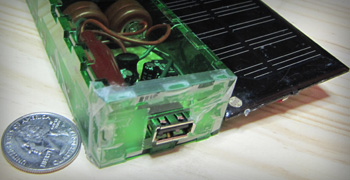 SPRING: Tuesdays 04/03/12 – 06/05/12 . 3:30PM to 6:00PM – $200
SPRING: Tuesdays 04/03/12 – 06/05/12 . 3:30PM to 6:00PM – $200
‘Solar Electronics’ will introduce students to the concepts and ideas behind solar energy and how we can harness it. We will learn about the basics of electricity, electronics, and solar panel systems through discussion, presentation, and hands-on exercises in which students will apply their knowledge. We will learn about the Photovoltaic (PV) effect and how sunlight is converted into electricity, using animations and group work to visualize this complex and abstract phenomenon to make it more easily understood. We will then build on this by covering the solar cell, array and module system. We will learn how to optimize solar arrays and how to calculate their power output. Our first project will be to build solar ovens (in which we will cook a snack) in order to understand solar thermal energy applications, consider the angle and concentration of light, and the resulting heat effects. Students will then make solar-powered lamps that they design, build and keep, and test the output over time to improve efficiency. Finally, students will work with a standard solar panel array to successfully power lights and small electronic devices in order to better understand and apply their new knowledge.
Create Wearable Electronics
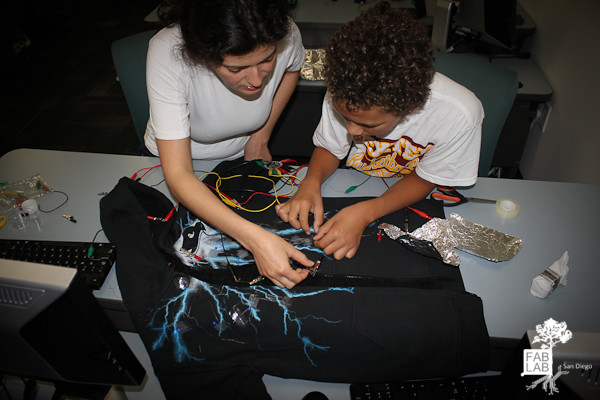 SPRING BREAK: Monday to Friday 04/02/12 – 04/06/12 . 8:30AM – 12:30PM – $200
SPRING BREAK: Monday to Friday 04/02/12 – 04/06/12 . 8:30AM – 12:30PM – $200
SPRING: Saturdays 04/07/12 – 06/09/12 . 1:00PM – 4:00PM – $200
‘Create Wearable Electronics’ is a project-based course focused on the use of electronics on textile surfaces. In addition to being a good introduction to electronics, this class is hands-on: students will create their own wearable projects, using the Arduino microcontroller. By the end of this course, students will have an intermediate level understanding of electronic and programming concepts, including, but not limited to: switches, sensors, networks, embedded systems and the “Arduino” microcontroller. This course is designed for students with some or no electronics/programming experience. While the course is fast-paced, it is a fun and hands-on application of learning, and students will be given thorough context and reference materials as well as personal assistance in class.
Do It Yourself Robotics
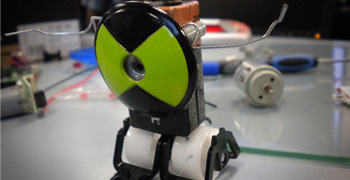 SPRING BREAK: Monday to Friday – 04/02/12 – 04/06/12 . 1:30PM – 5:30PM – $200
SPRING BREAK: Monday to Friday – 04/02/12 – 04/06/12 . 1:30PM – 5:30PM – $200
SPRING: Wednesdays – 04/04/12 – 06/06/12 . 3:30PM to 6:30PM – $200
Do you think it is possible to make a robot from your own vacuum cleaner? This workshop will show you how!
DIY Robotics is a course for students to learn how to design, build, and modify electronic circuits starting from the ground up. Topics include learning about the basics, transistors, and op-amps. We will begin with looking into the inside of obsolete electronics by opening them up and identifying their parts. Students will then reverse engineer the existing circuits to make their own modified version of the project. Over the sessions of the course, students will learn about the theories and concepts of electricity and electronics, as well as the fundamentals of microprocessors. At the end of the course, students will have created your own mechanical, electrical, and kinetic sculpture, widget or invention and learned about designing, engineering and electronics in the process!
Have fun with analog circuitry
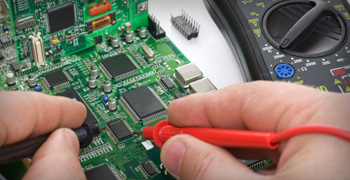 SPRING: Fridays – 04/06/12 – 06/08/12 . 3:30PM to 6:30PM – $200
SPRING: Fridays – 04/06/12 – 06/08/12 . 3:30PM to 6:30PM – $200
‘Analog Circuitry Fun’ is a great way to dive into the world of electronics. You will learn about all the great components and inventions that were at the very basis of the electronics revolution by replicating many of the experiments that led to these inventions and gaining a strong fundamental understanding of how these components work. We cover the theories that came out of this era of experimentation and then apply them within our own experiments. At the end of this course, you will have built your own resistors, buttons, solenoids, inductors, triggers and sensors, microphones, speakers, and more. In addition to creating their own experiments, students will learn about the electron theory, the electromagnetic and induction theories and more. This course is highly recommended as a complement to the ‘Wearable Electronics’ and ‘Arduino 101’ courses.
Arduino: Microcontrollers and Embedded Systems
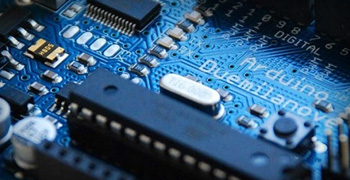 SPRING: Saturdays – 04/07/12 – 06/09/12 – 9:00AM to 12:00PM – $200
SPRING: Saturdays – 04/07/12 – 06/09/12 – 9:00AM to 12:00PM – $200
Arduino: Microcontrollers and Embedded Systems is beginner’s overview of the use of electronics. Over the sessions of the course, students will learn about the theories and concepts of electricity and electronics, as well as the fundamentals of microprocessors, and their place in history and society. At the end of the course students will have produced controllers and receptors based on the Arduino™ microprocessor, in order to accomplish various tasks. This course is highly recommended as a complement to the Wearable Electronics and Creative Computing courses taking place later in July and in early August.
Game Development in Flash
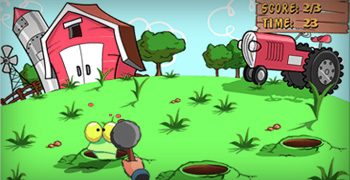 SPRING: Wednesdays 04/04/12 – 06/06/12 – 3:30AM to 6:30PM – $200
SPRING: Wednesdays 04/04/12 – 06/06/12 – 3:30AM to 6:30PM – $200
Have you ever wondered what is a Graphical User Interface (GUI)? This workshop will introduce students to GUIs and present industry design standards while teaching students how to use ActionScript to program their own animations! At the end of this course, students will be able to create and animate their own GUIs and will understand action scripting in a way that will allow them to create a diverse range of animations and web applications, preparing them for future pathways in game design and interactive media.
3D Modeling and Animation Using 3D Max
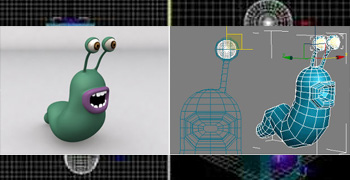 SPRING BREAK: Saturdays 04/02/12 – 04/06/12 . 8:30AM to 12:30PM – $200
SPRING BREAK: Saturdays 04/02/12 – 04/06/12 . 8:30AM to 12:30PM – $200
SPRING: Tuesdays 04/03/12 – 06/05/12 . 3:30PM to 6:30PM – $200
In this course students will learn 3-Dimensional principles and apply them in the creation of 3D representations using Autodesk’s 3ds Max. This course will give you the opportunity to create 3D objects and 3D places. You will arrange them in settings and environments for a movie or game or visualization. This course will introduce you to 3D animations and rendering.
Introduction to Web Development – HTML5
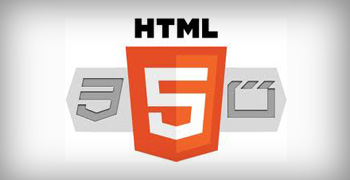 SPRING: Mondays 04/02/12 – 06/04/12 . 3:30PM to 6:30PM – $200
SPRING: Mondays 04/02/12 – 06/04/12 . 3:30PM to 6:30PM – $200
Introduction to web development technologies, through HTML5 (the latest major revision to HTML) and CSS are changing our understanding of the web. Students will learn how to build quality web pages using the latest technologies, and will come to understand how new technologies are affecting content on the web. This course is designed to give students a fundamental understanding of web design and development, enabling students to become proficient in the basic skills required to create their own website, and is taught using classroom and lab instruction employing lecture and demonstration, in-class exercises, student participation, and class activities leading to a final project. Classes will include introductory concept presentations, followed by in-class exercises.
![]()
Introduction to C++: Language Basics
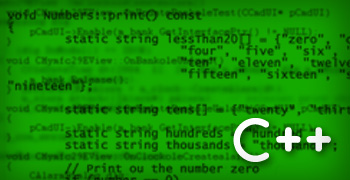 SPRING: Saturdays 04/07/12 – 06/09/12 . 1:00PM to 4:00PM – $200
SPRING: Saturdays 04/07/12 – 06/09/12 . 1:00PM to 4:00PM – $200
This class will introduce programming concepts to students, with no previous programming experience required, and will focus on learning to read and write programs in C++. The class will focus on in-class programming and participation. The class will move quickly and students are required to have access to a computer at home. We will cover IDEs, programming basics, compilation, execution, flow control, functions, arrays, pointers, file I/O, structures and classes.
Introduction to Java Programming: Java Language Basics
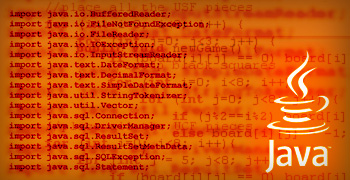 SPRING BREAK: Monday to Friday 04/02/12 – 04/06/12 . 1:30PM – 5:30PM – $200
SPRING BREAK: Monday to Friday 04/02/12 – 04/06/12 . 1:30PM – 5:30PM – $200
SPRING: Saturdays 04/07/12 – 06/09/12 . 9:00AM to 12:00PM – $200
This weeklong workshop introduces the structure, syntax, and programming paradigm of the Java™ language and platform. Students will learn the Java syntax you are most likely to encounter in the professional and research world and Java programming idioms you can use to build robust, maintainable Java applications. Students will be guided through the essentials of object-oriented programming on the Java platform, including fundamental Java syntax and its use. You’ll get started with creating Java objects and adding behavior to them, and conclude with an introduction to the Java Collections Framework, with considerable ground covered in between. This course will start with the very basics and assumes that students do not have any previous Java programming experience and does not require any other programming experience. This course will cover the fundamentals of the operative parts of Java and will introduce the basic programming concepts of Java programming.
Data Visualization
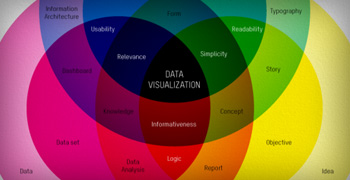 SPRING: Thursdays 04/05/12 – 06/07/12 . 3:30PM to 6:30PM – $200
SPRING: Thursdays 04/05/12 – 06/07/12 . 3:30PM to 6:30PM – $200
How can you take a large set of data and turn it into an info-graphic that conveys the information in an interesting manner? If this is something you are interested in, then you’ve found the right class! This is an excellent class to learn programming too. You will be using the programming environment called Processing. Because of the ease of use of the software, this class will get you visualizing information in no time. Initially, we will use a data set that is made available to the students, but you will get the opportunity to scrape any data online to create informational representations in various forms. This course is designed for students with some or no programming experience.
Mobile Applications – Android
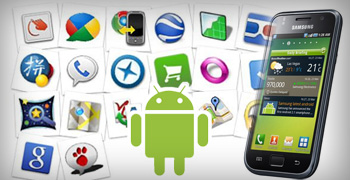 SPRING: Fridays 04/06/12 – 06/08/12 . 3:30PM to 6:30PM – $200
SPRING: Fridays 04/06/12 – 06/08/12 . 3:30PM to 6:30PM – $200
This course will introduce students to the Android mobile application development technology. We will explore Google’s Android SDK, with an introduction to the Java programming language used in developing these mobile applications. We will be using the Eclipse Integrated Development Environment (IDE). At the end of the course, students will have developed their own mobile apps paying special attention to User Interface Design practices. They will also have the opportunity to upload their applications to the Android Market for others to download and use their apps. This class is a great way to learn a new programming language too (no programming experience required).